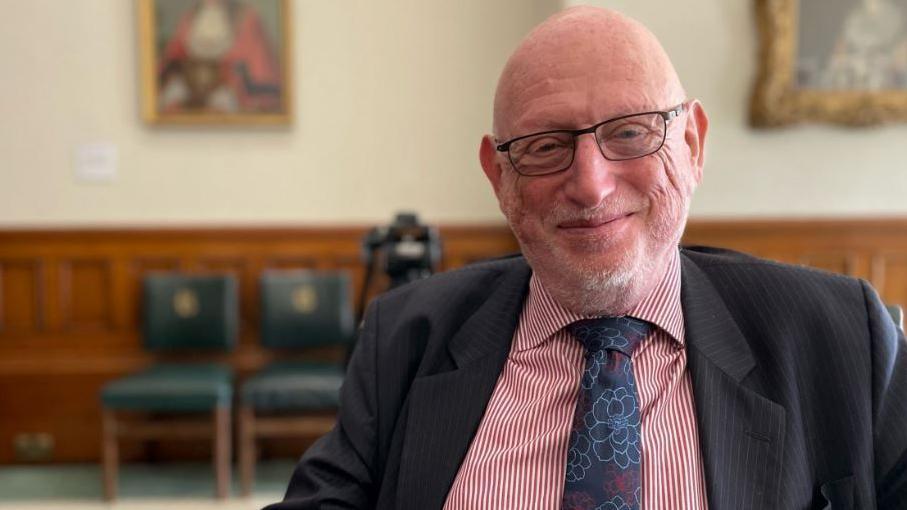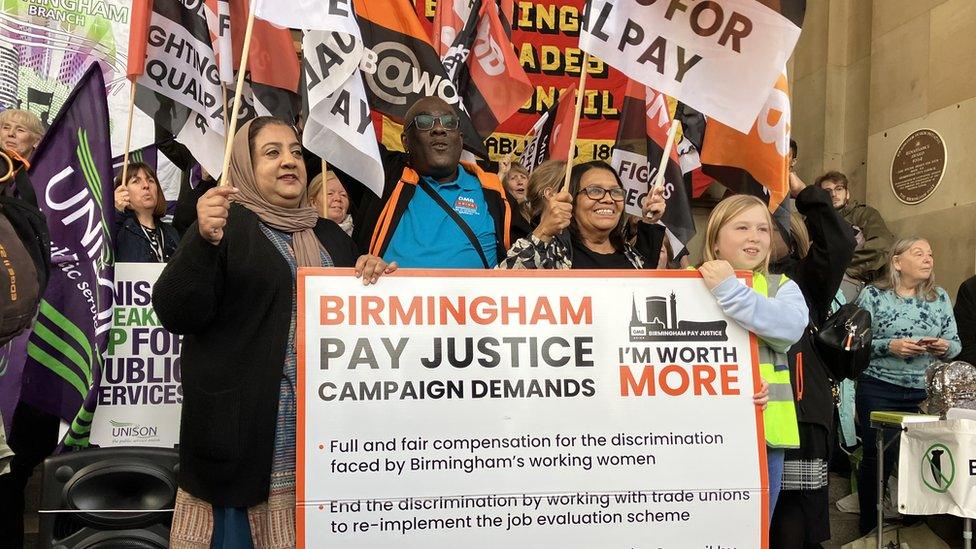'Bankrupt' council should ease savings burden - report

Protesters gathered outside the council in March when the authority signed off on a wave of cuts to services ahead of a 21% rise in council tax over two years
- Published
Tens of millions of pounds of budget cuts at cash-strapped Birmingham City Council could be avoided, according to a new report.
The Audit Reform Lab research group claims a "catalogue of problems and errors" by the council, IT suppliers, auditors and the former Tory government mean the problems could have been overstated.
The council is attempting to make at least £300m in savings and sell off assets worth £750m before April 2026 after essentially declaring itself bankrupt.
The authority said it was taking responsibility for failings that had contributed to its current difficulties.
However, the independent report by The Audit Lab, commissioned by the Unite, Unison and GMB trade unions, suggests that cuts to front-line services and selling off profit-making assets could cost the council far more in the long-term.
Meanwhile the authors, based at the University of Sheffield, said a 21% rise in council tax over two years was hurting local residents right now.
They called for a more considered approach to cuts, for the equal pay claims estimate to be properly audited, and for an inquiry into the issuing of the Section 114 notice, which effectively signalled the council was bankrupt.
Those equal pay claims were put at £760m in June 2023 and were largely blamed for the council issuing its Section 114 three months later, triggering the government at the time to appoint commissioners to oversee large-scale cuts.

Commissioners were appointed by government following the Section 114, although their salaries are being paid by the council
The Labour-run council has come under fire for not getting a grip on equal pay claims sooner.
It lost a Supreme Court case in 2012, brought by staff in female-dominated roles who successfully argued they had not been paid the same as counterparts in jobs traditionally mainly taken on by men.
Since then the local authority has paid out £1.1bn in payments to current and former staff over the past decade, but has struggled to draw a line under the issue.
In a report in September, external, external auditors Grant Thornton said the job evaluation process - designed to prevent future claims - while difficult, had taken longer than necessary.
In accountancy terms, the £760m is a liability - not representing payments being made at the time or even now, but those the council expects to pay at some point in the future.
Its scale also seems to have surprised the council's auditors at the time.
Issuing statutory recommendations in September, Grant Thornton said it had been repeatedly "provided with assurances" up to March 2023 that a provision of £150m in 2020-21 and £121m in 2021-22 was sufficient.
However, by May 2023 it said it was informed the liabilities were "substantially in excess of these provisions" and were estimated at up to £760m.

Dr James Brackley, lead author of the report, said the intervention at the council should be extended until 2028
The same report suggests that figure reflected new claims of up to £14m a month until April 2025, before a job evaluation scheme was agreed with unions.
However, that deal was struck in October 2023, a month after the auditor's report was published, and was expected to stem new claims.
Earlier this year, lead commissioner Max Caller said the bill could be less, but did not propose a figure.
In its response to The Audit Lab report, Grant Thornton said it had not audited the equal pay liability, and that work was ongoing, but to date the £760m remained "the most appropriate estimate".
It said it was not asked to "provide any assurance on that figure" at the time the council issued its Section 114 and that the local authority had proceeded "with full knowledge that the estimate was the council's own figure".
However, it added that there was a further six months before the authority issued its budget, giving it time to further analyse the estimate, and there was a recommendation to review that regularly.
The Audit Lab itself cited an estimate of closer to £250m rather than £760m and called for sweeping cuts to services and sales of anything other than loss-making assets to be paused.
While the two numbers are far apart, auditing it is unlikely to be a quick task.
Birmingham City Council is the largest local authority in Europe and its 2020-21 and 2021-22 financial statements have still to be signed off by Grant Thornton.
Instead of equal pay claims, though, The Audit Lab suggests the "real drivers" for the council's financial woes are austerity and a "disastrous" launch of a new IT system, purchased from Oracle.
Oracle itself has not commented.

The council has paid out more than £1bn in equal pay claims in the past decade
The IT system was brought in to overhaul internal functions including payments to staff and suppliers, as well as HR processes.
An initial bill of £19m has swollen to about £130m, and the council has previously acknowledged the roll-out's part in its wider financial difficulties.
The BBC understands dozens more staff have recently been taken on to try and unpick the problems that have in the past year seen bailiffs turn up at schools and seen some teaching staff go unpaid.
Dr James Brackley, co-author of The Audit Lab report, said the sums attached to Oracle, while sizeable, were much smaller than the published equal pay estimates and were also temporary, meaning financial pressures would be alleviated once the problems were ironed out.
"At the moment, things are being rushed through far too quickly and as we say we think tens of millions of pounds of cuts are being forced through to pay for what may ultimately be temporary overspends," he said.
"The problem with equal pay is it's not a real cash cost to the council right now, they're possible future claims, whereas what we're saying is, they should have really focussed on the Oracle issue as they are tens of millions of pounds of real costs going through the council right now... and will clear up once system fully implemented."
Dr Brackley is calling for the Oracle costs to be removed from the budget deficit and capitalised, essentially meaning selling assets to cover the bills, rather than cutting "crucial" services.
He has also called for that to be spread over a longer period of time - until April 2028.
'More bad news'
Calls for a slow-down in making cuts run counter to the message from the government-appointed commissioners, who have urged the council to speed up the process, saying that to do otherwise would make the situation worse in the long-term.
Last month, Mr Caller warned there was "more bad news to come" from the authority due to "slow progress" and the council was behind target.
In response to Monday's report, Mr Caller said its analysis contained "a number of misconceptions".
"The fundamental problem at Birmingham City Council is not about Oracle, nor is it about equal pay," he said.
"It is actually about their failure to deliver the budget savings over a number of years and that is what caused the huge budget deficits that they're facing at the moment.
"Oracle by itself is comparatively a small number," he added. "The failures of Oracle have destroyed their ability to know exactly where they are. But it's not a financial failure in the way in which they've described it."
He added the sale of assets since commissioners arrived had been in accordance with "best value requirements" and achieved good values which had gone towards reducing the deficit.

Lead commissioner Max Caller denied there had been any fire sale of assets
Responding to The Audit Lab report, Councillor John Cotton, Leader of Birmingham City Council, said he had been clear that the local authority needed to take responsibility for its failings, but that they had "not occurred in a vacuum".
"Report after report shows that there's a national crisis in local government caused by 14 years of neglect from the previous Tory government, combined with major rises in demand and cost led pressures," he said.
"We're now working very closely with a new government that clearly understands and values the vital role councils play up and down the country and I am encouraged by Labour's plans for multi-year settlements.
"After years of uncertainty, this would help us improve our financial management, and ultimately steer us to becoming a better-run council that delivers the services our residents deserve."
The Conservatives have yet to respond, but in September said the council had massively mismanaged its finances.
Follow BBC Birmingham on Facebook, external, X, external and Instagram. Send your story ideas to: newsonline.westmidlands@bbc.co.uk, external
Related topics
- Published24 May 2023

- Published19 February 2024

- Published28 September 2023

- Published10 October 2023

- Published28 June 2023

- Published25 May 2023
